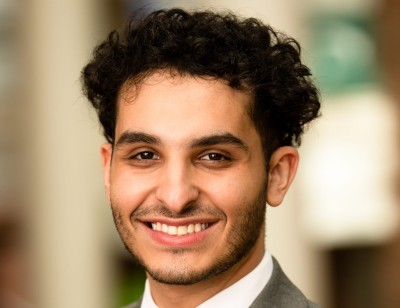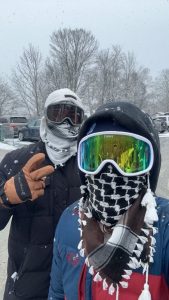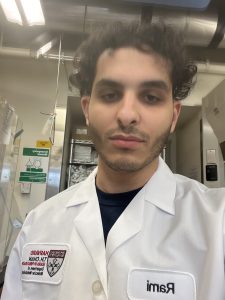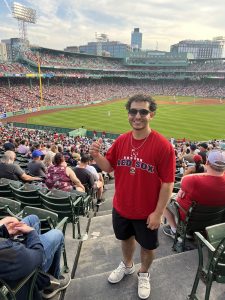Ambassador of the Week: Rami Darawsheh
02/28/2024
Student Ambassador Rami Darawsheh is a senior studying Health Policy and Management and Biology at UNC-CH, and Rami is the Office for Undergraduate Research’s Ambassador of the Week!
 We are so excited to feature Rami, and please check out our below interview where we discuss Rami’s research journey, his advice for undergraduate researchers, and Rami’s experience working with the OUR.
We are so excited to feature Rami, and please check out our below interview where we discuss Rami’s research journey, his advice for undergraduate researchers, and Rami’s experience working with the OUR.
Tell us a little bit about yourself. Where are you from? What did your road to UNC-CH look like?

I was born in Amman, Jordan, and moved to Greenville when I was 5. My interest in medicine began at a young age, and I was able to begin research and work at the hospital in my senior year of high school, which exposed me to a broad healthcare perspective through the Health Sciences Academy program. This program prepares high school students to address nursing and physician shortages in Eastern NC.
In my senior year, I participated in a yearlong program at the Brody School of Medicine that included mentored research and seminars, and I had the opportunity to work on a research project mentored by Dr. Andrew Ju.
My first project looked at lung cancer, which is aggressive and harder to treat than other cancers because lungs are not static structures. Radiation treatments need to be targeted and timed to account for breathing, which requires placing fiducial markers around the tumor. These markers help guide the machine that delivers targeted radiation. My first project was to look at data from patients who had already received treatment, highlighting the tumors and the markers to help improve the effectiveness of radiation treatments. We compiled this data and turned it over to physicists who update and improve the machines that deliver radiation based on our research.
Could you narrate your research journey at UNC-CH? Has your research changed since it began?
I started as a Biomedical Engineering major, but I took a global health policy class in my first year. The professor for this class was working with the World Health Organization (WHO) and policymakers to direct the United States’ COVID-19 response, and this class fascinated me and made me want to learn more about how to apply health topics to a larger population through a combination of tailored interventions and public policy.
In my sophomore year, I applied for the Amgen Scholars Program at Duke, and I was accepted. While there, I worked with Dr. Scott Floyd, a radiation oncologist, and my work at Duke circled back to the work I did in my senior year in high school. Dr. Floyd made research exciting, and this research experience helped me learn more about clinical research.
Our goal in the lab was to test drug effectiveness and its relationship to protein expression. While there, I learned many lab techniques, was given opportunities to take the lead on certain parts of the research, and I gained a lot of experience troubleshooting when things didn’t go as planned. It was sometimes intimidating being in a lab with lots of experienced researchers, but my colleagues and peers helped me feel like a part of the team and helped me think through problems. We would also sometimes troubleshoot after hours. Ultimately, that research experience taught me a lot and motivated me to continue research at UNC.

I now work in the Hingtgen Lab, where I engage in testing on tumors and drugs with a standardized diagnostic model, and I also do research in radiation oncology and on brain metastases, which is similar to the research I did in high school. One outcome of this research has been building databases of patient outcomes that detail patients’ health histories, insurance information, and treatments to assess treatment outcomes of different drugs either in isolation or in combination to improve cancer treatment.
I also did research in Summer 2023 at the Harvard School of Public Health, where I performed cutting edge research on nicotinamide adenine dinucleotide (NAD) and a recently discovered mitochondrial transporter. Because this research is so new, I felt like a detective trying to learn as much as I could about something health researchers were just starting to understand.
I am working on my honors thesis right now, and it explores the long-term neurological outcomes for patients who received whole brain radiation treatment, which is less common now that we can deliver focused radiation treatment. I am assessing the long-term impact and quality of life of patients from different backgrounds who received radiation treatment, and part of this research involves recruiting patients who have had either whole brain radiation treatment or focused radiation treatments for a clinical study so we can learn more from them about their treatment outcomes.
What has surprised you the most about engaging in undergraduate research?
I was surprised by how much professors trust you and how strong a sense of community there is. In my experience, professors care about me and my opinions, and they’ve motivated me over and over again. Professors want to see you succeed academically and as a person, and PIs and graduate student mentors are great at connecting you to other people in the field or directing you to conferences and other opportunities.
One of my mentors also bought me a cake when I got into medical school. No one had ever gotten me a cake when it wasn’t my birthday before, and that shows how proud they are of your accomplishments. All my mentors have been so good to me, and I hope that I can return the favor as I mentor my peers and students in the future.
What’s your favorite thing about doing research here at UNC-CH?
The community. I’m always telling people how great the community at UNC is, and while I’ve had lots of great research opportunities, my time at UNC has been the best. I now feel like I have a good network of peers and mentors who have helped open up doors that I never thought possible.
What has your time as an OUR Student Ambassador been like, and how has it shaped your approach to research and peer mentoring?
It’s made me a lot more interested in being a mentor. I remember sitting down with Bob Pleasants to talk about how to get started in research and how the OUR helped me out. It was hard to find an entry point into research at first, and this made me want to be a mentor so that I could help other students find their entry point.
My favorite part of being an OUR Student Ambassador is being a part of workshops on how to get started in research or discussing pathways to research in health and pre-health. I’m happy to play a part in helping other students find their way into research, and I enjoy interacting with my fellow ambassadors too. We help each other out and have formed a community of our own at UNC.
What advice would you have for any UNC-CH student who is trying to get started in research? What have you learned in your research journey that you wish you could go back and tell the version of you who was just starting off in research?
I would tell my past self and encourage other students to persevere and not give up. It’s going to be daunting and hard to try new things and learn new things. Ask questions. Ask as many questions as you can. There are no dumb questions, so ask lots of questions and keep on trying.

What media (books, tv show, movie, music, etc.) are you currently reading, watching, listening to, and why should we check it out too?
I watched a lot of Suits recently, and you should check it out because it will help you pass your Health Law and Ethics class. And you can impress your professor by already knowing the three elements of a contract!